Purple Pipes Painting the Way for Wastewater Reuse in Agriculture
How a drought-prone village in dryland Marathwada is shaping a spectacular circular future
By Dr. Anjali Parasnis, Kavita Sachwani, Ajith Radhakrishnan and KP Bakshi, IAS (Retd.)
Aurangabad occupies an important position in the cultural and economic milieu of Maharashtra. A city known for its rich cultural lineage, and architectural and engineering marvels, Aurangabad also boasts of a unique and intricate network of underground water supply canals, built by Malik Amber in 1617 that had once made it water secure.
Cut to 21st century Aurangabad. As a preferred destination for industries along the important Delhi–Mumbai Industrial Corridor, and the fifth most populous urban area in the state, Aurangabad generates close to a million employment opportunities for its citizens and migrants, attracting a steady flow of investments. Land–use changes triggered by rapid urbanization and climate change have led to a depletion of water resources in the city leading to a current demand–supply gap of 100 million liters per day (MLD). The Aurangabad Municipal Corporation (AMC) has consistently achieved high scores on Ease of Living (EOL) and Quality of Life indices (MoHUA, 2021) among the 100–plus Indian cities with a population of over one million, despite being crippled by recurrent droughts and moderately high vulnerability to climate change.*
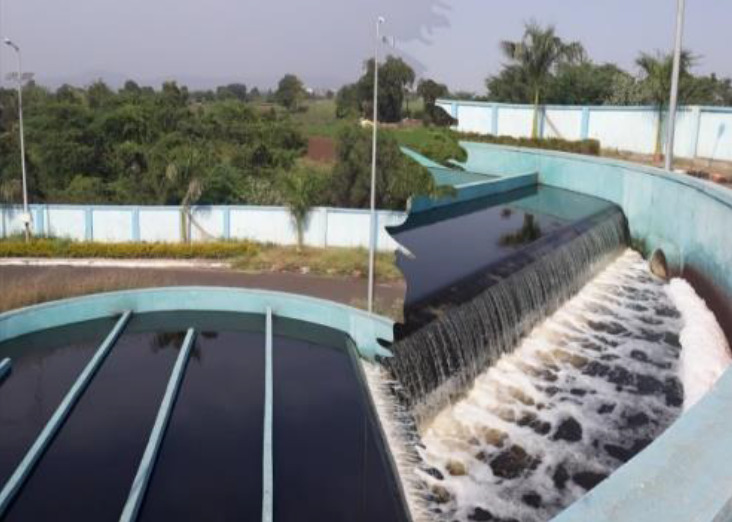
Reuse of water is vital for key industries, reducing the dependence on limited water resources. For farmers, one of the most important categories of users – the reuse of treated water is both an adaptive strategy and an economic tool. Reduced health risks from recycled water, opportunities to intensify and diversify the farm and non–farm operations, and lesser uncertainties contribute to improved adaptive capacities of farmers.
The two rivers Sukhana and Kham, are the primary sources of irrigation in the peri–urban areas of Aurangabad. About 15 km from the city, in Zalta village, AMC operates a state–of–the–art STP. With a capacity to process 35 MLD per day of domestic sewage, it treats an average of 20 MLD per day, directly releasing the treated water into the Sukhana river. Several farmers pump water directly from the river, which also receives surface runoff from farms carrying pesticides, antibiotics and fertilizer residues, stormwater, effluents released from chemical manufacturers, industries, and untreated sewage from settlements.
The AMC acknowledges the role of water as a critical enabler for economic growth and connector to the welfare of its citizens, prioritizing both demand and supply planning of water resources. Between 2017–and 2019 Aurangabad spent an average of 80 million USD annually to address the acute water scarcity caused by cyclical droughts.** A growing demographic pressure, erratic rainfall, declining groundwater table, and competing demands from industries have put the water distribution system and services under considerable strain. Astik Kumar Pandey, IAS, Commissioner, AMC has outlined the city’s plans to bolster the water security by focusing on both demand and supply interventions.
Baseline surveys and discussions with farmers in Zalta revealed an acute scarcity of water in the post–monsoon period and the absence of an alternate perennial reliable source of water, necessitating them to use untreated sewage for farming. Sick cattle, inferior quality of crop–dairy products, health issues including skin rashes, and allergic reactions for farmers and farm laborers on exposure to untreated sewage have also been reported.
The Water Resources Department of the Government of Maharashtra established a Multi–Stakeholder Partnership platform (MSP) on water vide a Government Order in 2017*** to pursue the implementation of multi–stakeholder oriented collective action promoting water security. The MSP platform supported by 2030 Water Resources Group (2030 WRG) has offered partnership–based solutions under the leadership of the state governments. Chaired by the Chief Secretary to the State government, the MSPs have been breaking siloed thinking, facilitating collective action, and catalysing innovations in financing and technology in the water sector.
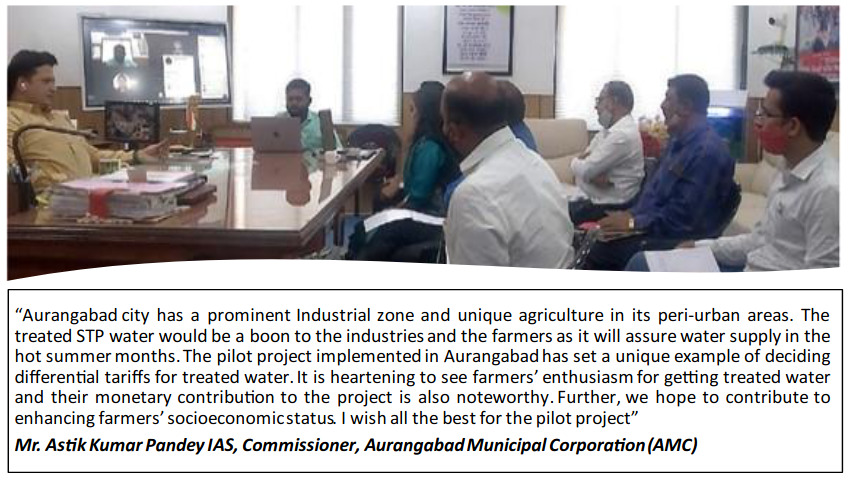 Pic 2: Consultations with the Commissioner, AMC, PoCRA officials, farmers of Zalta GP and 2030 WRG
Pic 2: Consultations with the Commissioner, AMC, PoCRA officials, farmers of Zalta GP and 2030 WRG
With active support from the Zalta Gram Panchayat and its farmers and the State government, 2030 WRG conceived a project to demonstrate a circular water recycling at Zalta which has been effectively executed by AMC. This is an inspiring story of Zalta Village and its farmers – and about the multi–stakeholder approaches required to mainstream wastewater – our precious alternative source of water. The story reasserts that there is a demand for treated wastewater for irrigation, as is evident with farmers willing to pay for the cost of the water and also electricity to pump the water, and so tariffs can be introduced for this revolutionary transition.
Upon the request of the AMC, the IIT Bombay and MSP platform undertook a rapid assessment of the quality of untreated wastewater used for irrigation, soil health status, and crop residue, which revealed bioaccumulation of contaminants and the need for treating the wastewater prior to irrigation.
Several focused group meetings and discussions of the MSP with farmers culminated in the formation of the Sukhana Jalakranti – a first of its kind Wastewater User Association (WUA) in September 2021. The members signed a formal request letter addressed to AMC requesting allocation of treated water and agreed to:
- Pay tariff as per regulatory guidelines of MWRRA for their consumption of treated water.
- Make their own infrastructure arrangements for the conveyance of recycled water from the STP to farm gates, which includes, pipelines, pumps, and electricity connections.
- Allow qualitative testing of soil, water, and crop samples pre and post usage of treated water.
- Maintain a record of crop productivity and socio–economic impacts of the pilot projec
An MoU signed by the AMC and Sukhana Jalakranti WUA on 9th March 2022 outlines the terms and conditions agreed upon between the AMC and the farmers. Pursuant to this, the farmers have started sourcing water from a common reservoir set up within the Zalta STP premises. The estimated cost of the project is about Rs 8 lakhs – with the farmers having spent about 60% of the cost on pipes, pump sets, electricity, and the cost of the water itself.
The AMC has spent on infrastructure development and is assured to maintain quality through regular testing. The farmers have agreed to pay Rs 1000 p.a. for treated water from Zalta STP and have agreed to install flow meters to help monitor usage on an annual basis.
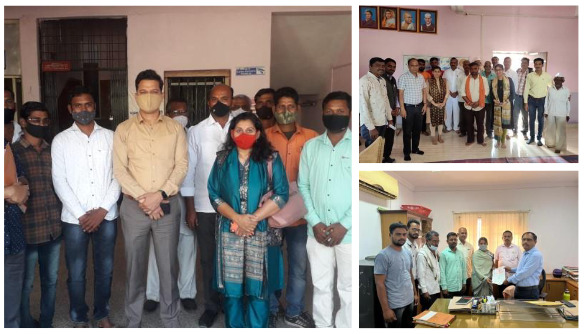
In a unique ceremony on March 26, 2022, Mr. Subhas Desai, Minister for Industries and a Guardian Minister of Aurangabad District dedicated the Recycled Water supply scheme for Agriculture to the State and its farmers by painting the pipes carrying recycled water to the farms, purple, as per the global uniform color code.****
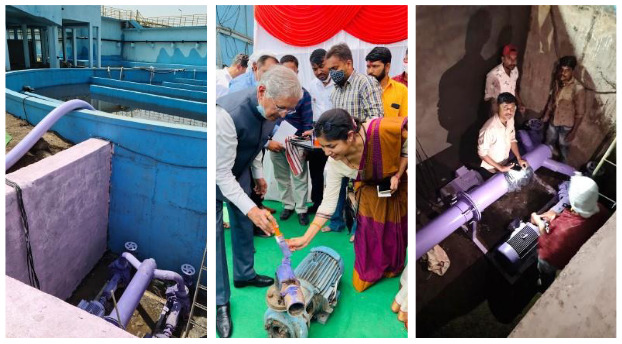
Farmer representatives handed over the cheque for treated water to the Aurangabad Municipal Commissioner, in presence of the Minister, and STP administrators. Zalta has captured the imagination of city administrations and farmers. The demand for such projects supplying recycled water to farms is growing and getting stronger. Encouraged by the outcome of this initiative, AMC has drawn up ambitious plans of collecting and treating more than 540 MLD of wastewater by 2024 which could be reused and recycled for various secondary applications.
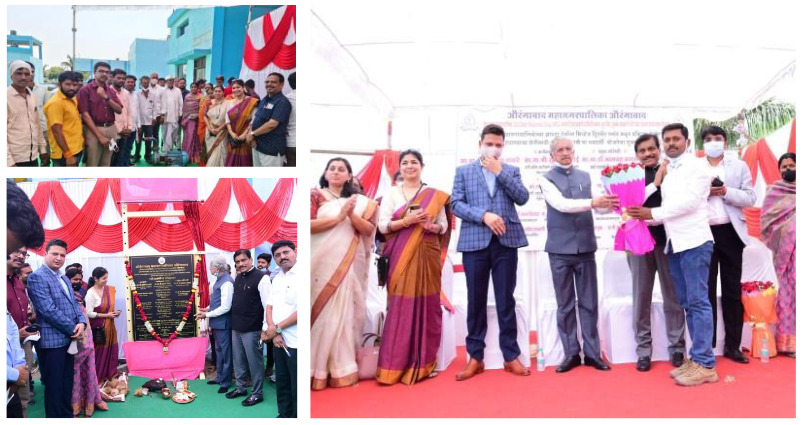 Pic 5: Inauguration and Zalta GP farmers handing over the cheque to AMC
Pic 5: Inauguration and Zalta GP farmers handing over the cheque to AMC
Growing demand for recycled water in farming, industries, and for non-potable uses in cities is opening new spaces for financial and institutional innovation including, the establishment of autonomous Special Purpose Vehicles (SPVs), capacity building on designing and financing water recycling projects for city administrations, innovative financial models that enhance private sector capital mobilization and the emission reduction of recycled water. Zalta offers a towering example of using multi-stakeholder partnerships to co-create solutions that achieve multiple social welfare and development dividends through a circular water economy.
Footnotes:
* Department of Science and Technology, India. 2020. Climate Vulnerability Assessment for Adaptation Planning in India using a common framework, Accessed online at: https://dst.gov.in/sites/default/files/Full%20Report%20%281%29.pdf
** Aurangabad: At Rs 274 crore, drought relief expenses shoot up in Marathwada region: https://bit.ly/3K5X5zU
*** Government Order No. Misc-2017/19/(07/17)/WR(Est.)
**** https://bestpractices.commongroundalliance.com/Appendix-B-Uniform-Color-Code-and-Marking-Guide/Uniform-Color-Code
